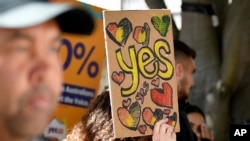Australians go to the polls Saturday in a vote for a constitutional change that, if successful, would guarantee Indigenous people a say in parliament, after a campaign that has been widely criticized for dividing the country through racist undertones.
The latest opinion polls indicate the ‘yes’ campaign is struggling to win over a majority of Australians and four of the six states required to change the constitution, a major setback for Prime Minister Anthony Albanese who initially put forward the proposal in March.
Back then more than 60% of the population favored constitutional change but one poll by RedBridge, conducted in late July, found that support has fallen to just 39%.
Surveys by pollsters Morgan and Essential during late September and early October have shown a slight increase towards the ‘yes’ campaign with about 43% in favor of granting Aboriginal and Torres Strait Islanders – two distinct cultural groups – a ‘Voice to Parliament.’
“It’s very exciting and yet very scary,” said Jill Gallagher, a Gunditjmara elder with the Aboriginal community in the southeast state of Victoria, who is advocating a ‘yes’ vote.
According to the 2021 census there are 983,700 Aboriginal and Torres Strait Islanders, about 3.8% of the total Australian population, divided into some 300 nations speaking 170 different languages, who have occupied the continent for more than 60,000 years.
Historians have documented at least 400 massacres of First Nations people since European settlement began in 1788. They remain the most disadvantaged group in Australia with a life expectancy about eight years less than the national average.
Unemployment, suicide, domestic violence and imprisonment rates are all disproportionately higher when measured against non-Indigenous Australians.
“We’ve been disempowered for so long and it’s important that our peoples are recognized," Gallagher told VOA. “But more than just recognition it’s about having a voice that we can talk to parliament and the senior government of the day.”
Two constitutional amendments have been put forward, whereby “the Aboriginal and Torres Strait Islander Voice may make representations to the Parliament and the Executive Government” on issues that affect them.
Further, parliament shall “have power to make laws with respect to matters relating to the Aboriginal and Torres Strait Islander Voice.”
The Voice emerged from the “Uluru Statement from the Heart” written by delegates to the First Nations National Constitutional Convention, held in Central Australia in May 2017. Gallagher was among the signers.
She said the Voice would also put “the final nail in the coffin of Terra Nullius” meaning “land uninhabited,” a concept used by the British to justify colonization. Aboriginal advocates say Terra Nullius was used to avoid the word “invasion” and the miscarriages of justice that followed.
“Colonization has happened, it’s here, we can’t do anything about that, we can’t change the past,” Gallagher said. “But what we have to do is work out how, as an Indigenous people, how do we live in two worlds.”
Constitutional change requires a double majority, meaning more than half of Australians at the national level and within at least four of the six states must approve the amendments for The Voice to pass. Then an Indigenous executive body can be established to advise the government.
Early voting began last week, with all major religious groups, many Australian corporations, artists, musicians and major league sporting clubs backing The Voice.
Left-leaning Albanese voted yes, telling journalists, “I did so proudly in the knowledge that non-Indigenous Australians are being asked to grasp the hand of friendship.” But campaigning has also split along political party lines.
The right-wing conservative opposition, including former prime ministers John Howard and Tony Abbot, have campaigned for the ‘no’ vote, warning constitutional change would divide the country by race, while others have argued the amendments lack detail.
A small minority of Aboriginal and Torres Strait Islanders are also voting no, saying, The Voice does not go far enough. They want treaties at a national level similar to New Zealand and Canada. Separate treaties are currently under negotiation, individually, by Australia’s states.
"We are being asked to recognize the legitimacy of the white constitution, and in the most meaningless way," Michael Mansell, a lawyer and prominent activist with the Blak Sovereign Movement, told broadcaster ABC.
"A treaty confers rights on Aboriginal people and imposes obligations on all governments. A ‘Voice’ does not confer any rights and doesn't impose any obligations," he said.
Hackers in China have also been accused of attempting to amplify social discord. A July report, by the Australian Strategic Policy Institute, found fake social media accounts were part of an “ongoing Chinese Communist Party influence and disinformation campaign.”
It said platforms including Facebook, Instagram, YouTube and X (formerly Twitter) were being used to target “Australian domestic and foreign policies, including by amplifying division over the indigenous voice referendum.”
Gordon Conochie, a senior research fellow with La Trobe University in Melbourne, said the campaign emerged from a low starting point and it was easy to find a few Aboriginals who don't want The Voice and promote them, even though 80% of Indigenous are in favor.
That had resulted in widespread misinformation, he said.
“Most Australians have never met an Aboriginal person,” Conochie said. “It's difficult for many Australians to understand how important the idea of recognition can be and how important it is for Aboriginal people to have their distinctive voice and experience heard within Australia.”
He says non-Indigenous Australians should embrace The Voice and the world’s oldest surviving culture, enabling children to learn an Aboriginal language, history, dance and the culture of first nations in their local area.
“It would be amazing for Australia to embrace Aboriginal history of this land and it would make Australia distinctive, unique and the world would look to Australia as being something more than just an England in the Sun," Conochie added.




